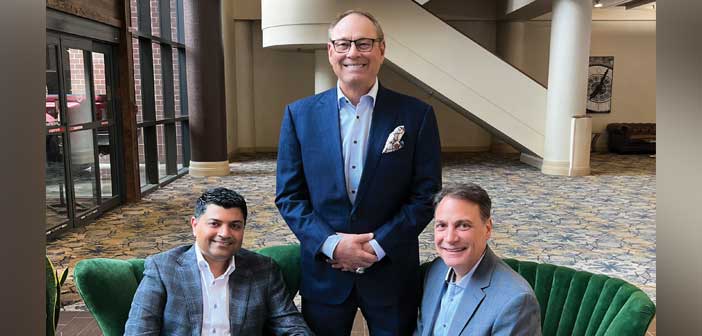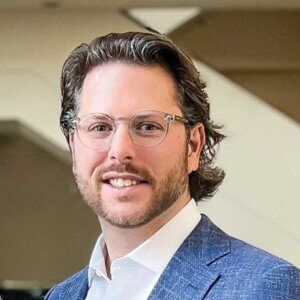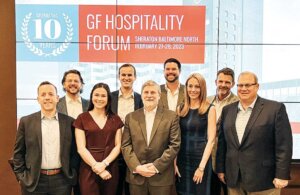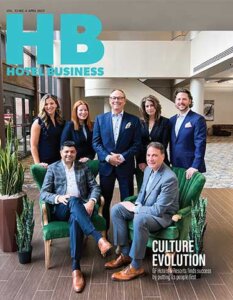The pandemic changed it all—how we think, how we operate and how we interact with others. Companies were forced to shift to keep up and evolve to meet new needs, and, when they did catch up, a new curveball was thrown.
New technologies and protocols, but what about the people? Humans are what make hospitality hospitality.
For Philadelphia-based GF Hotels & Resorts, a full-service hospitality ownership and management company, its people are at its core and always have been, but the pandemic made its leaders look at its culture quite differently.
“The pandemic changed the world, and changed people, not just what they expect from their employer and job, but it changed how they look at the world,” said John Rubino, president/COO, managed division, GF. “We knew that we had to pivot because people changed, so we looked at what was important to our team members.”
Pre-pandemic, GF’s leaders spoke about growing the company based on the vision of its founder/CEO Kenneth Kochenour.
“Built on a foundation of hard work and accountability, the success of GF Hotels & Resorts can be attributed to the unwavering entrepreneurial spirit that permeates every aspect of our organization,” Kochenour said. “From the beginning, GF has been committed to inclusivity, with diversity being a key part of our culture. Our leadership team reflects this commitment, sharing different perspectives and expertise that enhance our company. At the end of the day, our focus is on our team, our employees, our brand relationships and our clients. We are driven by our core values of integrity, diligence and financial responsibility, which have continued to strengthen our company during the most challenging times.”
The company certainly had plans to evolve, but then COVID hit.
“We thought, ‘What do we do now?’” Rubino recalled. “Ken stood strong to where he wanted our company to grow and who he wanted us to be. We stood by that plan to be able to grow. We always had this vision that the strongest teams are a combination of fresh talent with new ideas, but also tenured team members who have a rich history and knowledge of the company.”
The company, which has a 35-year history behind it, built a team with all these attributes. GF didn’t make any corporate layoffs during the pandemic, which was a good move since its portfolio doubled in size during that time.
“The one thing we continue to highlight is that we’ve really become more people-centric, and we focus on empowering our employees and allowing them to become as creative as possible and make the most impact we can on the communities in which we serve,” said Ryan Alpert, EVP, sales and commercial strategy, GF.
Alpert believes that as business leaders, they have a responsibility to make a positive impact on society. Throughout the pandemic, the corporate team realized it is stronger together and instituted new initiatives to support this culture shift. These programs include regular employee feedback surveys and leadership development training programs, among others—all geared around raising GF’s efficiency to produce better results.
“The way that we’ve always gone about it is speed to market,” Alpert said. “The real strength of GF is our ability to be able to understand root causes, come up with a strategy and then implement that strategy at a very fast pace. But, also, being extremely efficient. All of that has been heightened over the past couple of years.”
GF has prided itself on GF University (GFU)—a program it’s instituted for years—which brings all its team members together in one location several times a year to provide training on different topics. However, once the pandemic struck, this was made impossible.
But the company used this setback as an opportunity to make the program even better by moving the training online.
“By [making GFU virtual], we were not just able to have a general manager, director of sales or HR director come; we were able to open this virtual training up to all of the leaders at the hotels,” Rubino said. “Now more people could be exposed to this training without the cost of having to travel. Now we can train more people.”
Also, because of the downturn in travel, the company had more time available so it could conduct more of these critical trainings.
“We concentrated on our team members’ skills to not only run their hotels better, but also skills they can use in their personal lives and careers to help them advance,” Rubino said.
Vineet Nayyar, president/COO, owned division, GF, who’s been with the company since 2000, has seen his fair share of rough times—9/11, economic crises and, then, the pandemic. He said what GF has always gone back to during these periods has been its trust and transparency with team members.
“We’ve been around for a long time, and we all love what we do, which is hospitality,” he said. “With all the lives lost and employees touched with furloughs, we’ve been more sensitive, and we’re building the trust every single day. We’re more transparent with the way we do things, and we’re committed to developing the culture.”
This commitment to open communication is something that the GF leaders spend a lot of time on, adding HR forces internally with hotel support to make sure employee well-being is at the forefront. Additionally, GF is making efforts to recognize and reward team-member loyalty.
“During the pandemic, the employees who stuck around all the way through with us during tough times, we’re recognizing them and rewarding them in different ways,” Nayyar said.
This recognition comes in the form of compensation, changing roles and cross-training, which has been particularly beneficial to the GF family. “Travel was becoming more difficult, but it was still important for us to make sure that our leaders were touching the people and seeing the people,” Rubino said. “Although travel was limited, it didn’t completely stop.”

LEFT TO RIGHT: Scott Crunk, SVP, operations; Ryleigh Leonard, executive administrative assistant; Ryan Alpert, EVP, sales and commercial strategy; Lynsey Kreitzer, SVP, sales & commercial strategy; Nick Bilotta, SVP, operations; Karli Monger, development coordinator; and Keith Schreiner, CFO
So, GF created area roles, which allowed it to be able to have people closer to its hotels. This was a win-win for the company because it also created career opportunities for associates. For instance, a team member may have gone from a GM at one hotel to an area GM with a few more hotels reporting to him or her.
“We gave better support to the hotels that needed it because they now had another team member to go to and be a mentor,” Rubino said. “That provided better support because they have someone closer to them, and it also created career opportunities to expand their knowledge.”
Staying involved with team members is essential for GF and its vision, Rubino noted, and the response from the company’s associates has been extremely positive.
“We really want to stay close to our team members and to the culture,” he said. “We make sure there’s open communication at every level, from the top and within the hotel. It’s not just the GM; it’s the communication that the department manager has with his or her team members.”
Another resource GF added was an employee hotline, allowing team members to anonymously reach out to leadership with comments or concerns.

DoubleTree by Hilton Hotel Orlando Airport is one of the properties in the GF Hotels & Resorts portfolio, which doubled in size during the pandemic.
“Sometimes [team members]don’t always feel comfortable going to their immediate supervisor, HR manager or GM, so we started this confidential employee hotline,” Rubino said. “If they have a concern, they can call that hotline, and we can address that issue.”
This has allowed the team to be better in tune with what’s going on at the property level so that they can make sure team members maintain their happiness. “We think that was critical, and they appreciated that path to voice concerns or just voice their pleasure with their work environment,” Rubino added.
The numbers GF is seeing surely prove its employee resources are working, with satisfaction ratings soaring and its team growing.
“Now we have team members actively seeking to advance their careers with us,” Alpert said. “In addition, they’re referring amazing candidates daily. We’re promoting from within as a first selection should we have the best candidate, but what we found was that our top leaders in the field are now our biggest recruiting resources because they understand what it truly means to be part of our GF community. That, in turn, has allowed us to grow top talent and grow our bench strength.”
Nayyar said that pre-COVID, the company didn’t realize how many of its employees had other skills and could excel in a number of positions.
The GF executive added, “We are now recognizing individuals and saying, ‘Do you want to do other jobs?’ And, they’re thinking, ‘I’m excelling in other jobs because the employer is asking me to do things I’d never thought I’d do.’ We’re really big with transferring internally. That’s been a big success for finding superstars within the organization.”
These skills allowed team members to advance their careers in new ways and, as Nayyar noted, also allowed GF to promote from within.
“For us as a company, it was always about retention,” Rubino said. “All these programs were all critical decisions we made to be able to give to our team members. Having lunch or having an extended break are important and team members appreciate that, but it’s all about what you’re doing to help them provide for their families. Being able to give them this training and education can allow them to be able to advance their careers, and that can be impactful for generations.”

GF Hotels & Resorts looks out for all its personnel, including these two CoCo Key Hotel and Water Resort team members.
GF CAP (Career Advancement Program), for example, is a career advancement program that allows the company to take employees at every level and department and provide them with training to be qualified for advancement at GF or within the industry.
“We have team members who were so excited to be accepted into this program because now they can move up a level in their career and set an example for their children to be able to achieve more,” Rubino said. “Making them feel part of a community in their hotel and making them feel part of a team, it’s how they’re made to feel every day and cared about as an individual.”
Rubino recalls a story that resonated with him when the company introduced the program. It was by nomination only, meaning leaders of the hotel and company had to nominate team members that they thought would be good for the program, and they had to be accepted.
“I remember hearing the story of one team member who was accepted and was so overwhelmed and happy that she was crying because she was going to be part of this program and be able to learn new skills to be able to advance her career,” he said. “She was never able to afford to go to college. She wasn’t afforded that opportunity, but to have someone take an interest in her to be able to train her and make a difference in her life and in the lives of her family was so emotional for her. I remember hearing that story and feeling so good about this one decision we made that can change somebody’s life.”
The pandemic has also taught GF leaders to be better listeners, and along with its hotline and training programs, it has implemented annual team satisfaction surveys and performance feedback.
“We don’t just look at those ratings and say this hotel scored high or low,” Rubino said. “We look at where we scored high and low at each hotel, and what the comments were. Then, that GM, along with his or her VP of operations or area HR manager, sit down and develop plans around how we can be better and better support our teams.”
GF’s performance feedback is unlike others of its kind, Alpert explained, because it incorporates continuous feedback that evolves the conversations between employees and their supervisors.
“This approach, we believe, is super-effective since we’re able to get real-time feedback which allows us for immediate action,” he said. “Then, throughout that time, we’re looking at goal-oriented feedback, and we’re putting in specific goals. It involves a constant conversation.”
It’s a different approach than typical feedback, Alpert added, but it works.
“The way that we’ve used AI in this approach I believe has transitioned us into this new age,” he said. “The continuous feedback for us has really been a catalyst. We’re able to challenge our teams and provide the constant support that they need in some of these new roles. We didn’t take the expectation that everybody knew how to do their jobs. We went through this together holistically, and we’ve worked with one another. We’re a company that believes that we’re going to provide support and roll up our sleeves. We work for the field, not the other way around. That has been an authentic transition for us that I think that has set us apart.”
GF’s leaders also recognize the need for a diverse workforce, which, Alpert noted, brings unique perspectives. “We needed to be as inclusive as possible throughout what we’re seeing in this new world,” he said.
GF used the knowledge of team members based in all areas of the country and with different career backgrounds to inform its team about trends. This helped the company keep its pulse throughout the country, especially as changes were happening almost hourly.
“We were trying to stay ahead but also realized the benefits of having a diverse workforce and including creativity and innovation for better decision-making,” Alpert said. “We’ve used a lot of that along with data-driven strategies to be able to make that impact. I’m really proud of that. We’ve been able to level up our team on a lot of different fronts but also get them more involved in the decision-making process to help us craft strategies that made sense. That’s been one of the silver linings throughout the pandemic.”
Although GF has seen success promoting from within and leveraging associates as recruitment tools, much like the rest of the industry, the company has been looking for creative ways to attract aspiring hospitality professionals.
“When we look at the ways we can leverage social media and other digital channels, I think we can get communities and other industries excited about what we’re doing,” Alpert said. “It’s a rewarding career path and we need to share those success stories more.”
In addition to social media platforms, Alpert believes that partnering with educational institutions to promote the industry as a viable career path is critical along with other, more organic methods.
“It’s also when we’re out on the weekends or out to dinner, you’re talking with family and friends about all those perks, along with developing training programs and benefits and using all these partner opportunities,” he said. “I think that’s how we need to continue to evolve. These aren’t new strategies, but I think we have to be more intentional around the key components of those.”
Because hospitality lost some great talent to other industries, broadcasting the values of a hospitality career is essential.
“We’re making everybody aware of what hospitality is all about, which is customer service and a fast-paced environment,” Nayyar said. “It’s also about hiring individuals who have never been in our industry.”
He added that offering competitive compensation and benefits is more important now than ever, along with communication with team members about their career goals.
“I don’t know many other industries that have so many levels of team members,” Rubino said. “It’s what you put into it and what your company is doing to get you there. We feel as a company, we’re doing everything we can.”
Alpert said that throughout the past few years, GF has created mantras that it’s worked to live by. The first year was the “year of action.”
“When COVID hit, everyone was paralyzed,” he said. “We took the opposite approach. We wanted to create playbooks on how to handle this new world and we weren’t using some old skillset. We realized very quickly we needed to evolve because the business model had changed.”
The following year, it was “make an impact.”
“We created blitzes throughout our communities with sales calls, prospecting calls, closing blitzes and community services projects,” Alpert said. “We really went far and above anything we had envisioned.”
This year is the “year of accountability,” challenging team members in all facets of life to continue to level up.
“Those mantras have been catalysts for us,” Alpert said. “We have a continued vision. Company culture isn’t a message on LinkedIn. It’s what the people feel and how they resonate with what we’re doing every single day.”
Alpert noted that GF has also grown with partners over the past few years but has been very intentional with this growth and its strategy.
“We haven’t just picked up contracts to pick up contracts,” Alpert said. “All of us can appreciate that the workplace culture is constantly evolving. As technology advances and as the needs and expectations of employees change, we must adapt to remain competitive. At GF, we believe the future of workplace culture is centered around creating an environment that empowers employees to be their best selves. It’s focusing and fostering collaboration and teamwork and prioritizes work-life balance and well-being.”
And although GF’s portfolio has doubled in size throughout the pandemic, it isn’t looking to be an industry giant, according to Rubino.
“We feel we’re at a good level, maybe adding a few more hotels in the next year, but we also want to grow our team members as we grow our company,” he said. “We don’t want to grow our company and then have to go out and find people to be able to service new accounts. We want to be able to have those team members right here from day one being able to give our owners what they expect from us when we manage our hotels.”
Nayyar said that GF is financially stable but does want to grow strategically and purchase new properties. However, its culture is never out of sight. “At the end of the day, we understand clearly that our key partners are our employees,” he said. “That’s the strength.”
Team members at all levels in GF contribute to its culture, Rubino noted, whether it’s a leader at the C-suite, a department manager, a supervisor, etc. In fact, Rubino said that when he addresses the company as a whole, he starts off with the importance of culture and feeling good about who each team member reports to.
“Typically, what I tell these new team members is I don’t want you to treat your employees the way you want to be treated,” he said. “I want you to treat them the way you want your mother, father, husband, wife, son and daughter treated. We typically have a greater expectation for how our loved ones are treated than how we’re treated. I want them to be able to treat their team members every day like they’re part of a family.”




